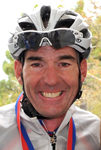A seasoned cyclist will have enough carbohydrate stored in their bodies to provide them with around one to two hours of high intensity cycling. Once the carbohydrate stores are depleted the cyclist then “bonks” or hits the wall. If you are riding at a more leisurely pace, then you’ll find that your carbohydrate stores will last longer than if you are riding at race pace.
There are two standard protocols for endurance sports nutrition. The 30-60 grams of carbohydrate per hour and the 1 gram per kg of body weight per hour. I recommend that you adopt the 30-60 grams of carbohydrate per hour nutritional protocol if you plan to ride at a leisurely but steady pace. If you plan to ride at a race pace, then the 1 gram of carbohydrate per kg of body weight per hour is a more suitable nutritional protocol to follow.
These carbohydrate requirements can be met by consuming a variety of combinations of sports drinks, sports bars and gels and normal food like fruit, ANZAC biscuits, fruit cake and sandwiches. I also recommend that the faster you go the more you’ll want to rely on products that are able to be consumed and digested quickly like sports drinks, gels and sports bars.
If you are ride more leisurely then you will have more time so you can choose “real” food to fuel you. Most products now have their carbohydrate content listed on the outside of the packet. This makes it relatively easy to work out how many of them you’ll need to eat per hour. Most gels and sports bars contain around 20-30 grams of carbohydrate so consuming two to three of these products per hour will generally meet the majority of most people needs.
Remember that these are guidelines only! As everyone has their own preference to the type of food they prefer to consume, I strongly recommend that you experiment to work out your nutritional requirements during your training leading up to the C2K. Also, people with larger builds (heavier) consume more carbohydrate per hour than smaller (lighter) built people. Please take this into consideration when working out your nutrition plan.
Till next time,
Good luck with your preparation! The next article will discuss hydration.
 Written by David Heatley, Accredited Cycling Australia Cycling Coach and Director of Cycling-Inform.
Written by David Heatley, Accredited Cycling Australia Cycling Coach and Director of Cycling-Inform.
